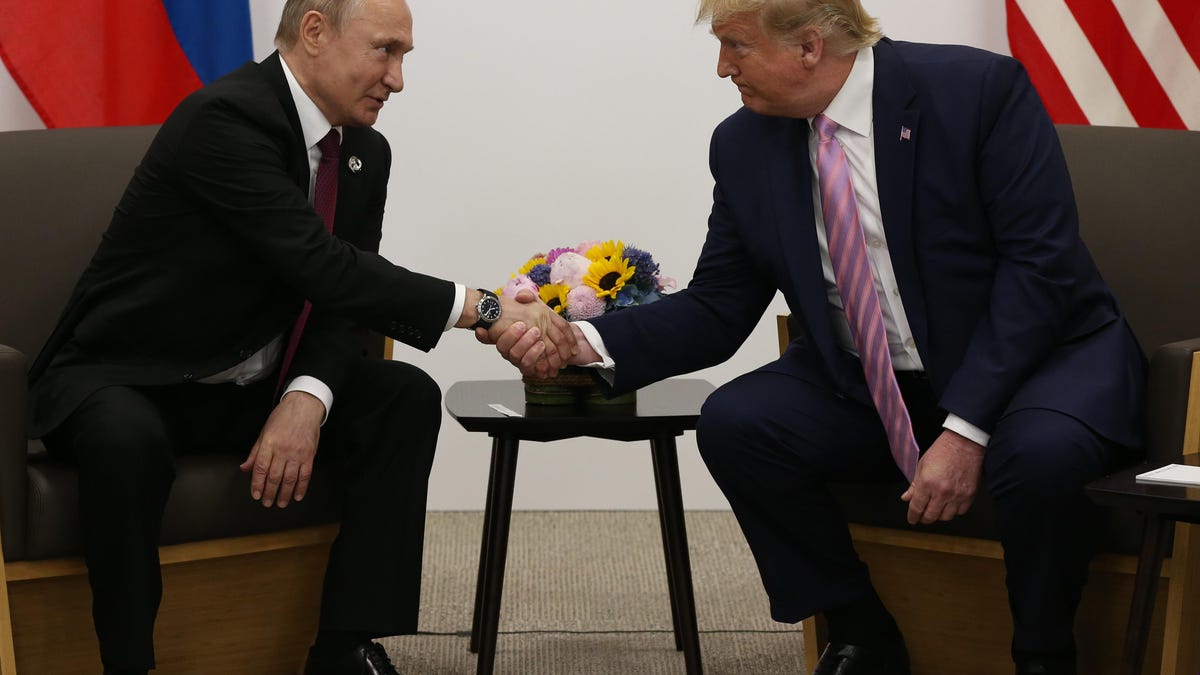Senate committee finds Trump campaign welcomed Russian hacking help
A 966-page report says the president's 2016 campaign was eager to use documents stolen by foreign hackers.

US President Donald Trump greets Russian President Vladimir Putin during their meeting at the G20 Osaka Summit in 2019.
In June 2016, shortly after a leak of stolen documents tied to the Democratic National Committee, a Trump campaign staffer asked higher-ups if election rules prevented the campaign from obtaining material that had been hacked and published online. John Marshburn, the campaign's policy director in 2016, responded: "I don't see a problem. Just like WikiLeaks material."
That exchange, detailed Tuesday in a 966-page report on Russia's 2016 presidential election interference, from the US Senate Select Committee on Intelligence, reflected the Trump campaign's willingness to use hacked documents during the contest for the White House against Democratic nominee Hillary Clinton.
The report highlights multiple instances where the Trump campaign promoted stolen material provided by Russian hackers, even after the US intelligence community warned that the data came from the Kremlin. It also showed a coordinated effort between the Trump campaign and WikiLeaks, an organization that publicly released many of the documents stolen by Russian hackers.
"The Trump campaign publicly undermined the attribution of the hack-and-leak campaign to Russia, and was indifferent to whether it and WikiLeaks were furthering a Russian election interference effort," the report stated.
The Trump campaign didn't respond to a request for comment.
Russia's cyberattacks against Clinton's campaign and the DNC left a lasting impression on US politics and tech companies, and election officials and campaigns have ramped up security measures to prevent a repeat. Google, Facebook and Twitter now regularly meet with government agencies to prevent the spread of election disinformation on their platforms.
The attacks haven't stopped. Countries like China, Iran and Russia are actively working to influence the 2020 presidential election through cyberattacks and social media, the office of the director of national intelligence warned in a statement on Aug. 7.
President Donald Trump
The Senate committee's report, published Tuesday, points out the extent of how intertwined the Trump campaign was with Russia's interference efforts, as "campaign leadership reacted positively to the news that the DNC had been hacked by the Russians."
"At nearly 1,000 pages, Volume 5 stands as the most comprehensive examination of ties between Russia and the 2016 Trump campaign to date -- a breathtaking level of contacts between Trump officials and Russian government operatives that is a very real counterintelligence threat to our elections," Sen. Mark Warner, vice chairman of the committee, said in a statement.
Campaign links
Despite denials from Trump and his campaign about reaching out to WikiLeaks, the report found that the president had directed campaign officials to keep in touch with the organization for documents that would help his election bid.
The coordination included the timing of leaking documents. In October 2016, when the Trump campaign learned of an Access Hollywood tape being made public, in which the president described groping women, Trump operative Roger Stone called for the "Podesta stuff" to be released to "balance the news cycle," according to the report.
Stone was referring to the thousands of emails stolen from Clinton adviser John Podesta, which Russian hackers obtained in a spear-phishing attack.
About 30 minutes after the Access Hollywood tape was released, WikiLeaks published 2,050 emails from Podesta, which the Trump campaign used in its press releases and speeches.
In multiple remarks, Trump praised WikiLeaks, calling the leaked documents a "treasure trove" and encouraging people to read the stolen documents.
The campaign continued to use the stolen documents even after the US intelligence community assessed that they came from Russian hackers looking to interfere with the election.
The report also found that then-campaign chairman Paul Manafort worked closely with Russian intelligence officer Konstantin Kilimnik, who the committee said was likely linked with the hacking efforts against the DNC.
"While the GRU and WikiLeaks were releasing hacked documents, the Trump campaign sought to maximize the impact of those leaks to aid Trump's electoral prospects," the report said. "Staff on the Trump campaign sought advance notice about WikiLeaks releases, created messaging strategies to promote and share the materials in anticipation of and following their release, and encouraged further leaks."
Russian denial
Even after learning that the leaked documents came from Russian hackers, the Trump campaign publicly denied the intelligence community's findings.
During a 2016 presidential debate, Trump suggested it could've been China behind the cyberattack, a theory he echoed into 2017.
The president has also pushed a false narrative that Ukraine was behind the DNC hack, which he asked about during a 2019 call with Ukraine's president. The push to pin Russia's hacking on Ukraine stemmed from Kilimnik, and made its way into the Trump campaign from his work with Manafort, according to the report.
That effort continued on social media through Russia's disinformation network, the committee said.
WikiLeaks has also denied that it knew the documents came from Russia, but the committee's report noted that the organization "very likely knew it was assisting a Russian intelligence influence effort." The evidence detailing that is redacted in the report.
The report reveals the many ways Russian hackers were able to influence the 2016 presidential election, as a warning for future campaigns. While it was able to steal sensitive documents on its own, it relied on social networks like Twitter to spread the material, and a cooperative campaign to use the hacked emails.
"This cannot happen again. As we head into the heat of the 2020 campaign season, I strongly urge campaigns, the executive branch, Congress and the American people to heed the lessons of this report in order to protect our democracy," Warner said.

